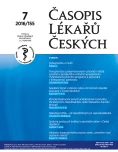Correct indications and performing of autopsies in the Czech republic
Authors:
Tomáš Vojtíšek 1; Štěpánka Kučerová 2; Petr Kyzlink 3; Miloš Sokol 4
Authors‘ workplace:
Ústav soudního lékařství LF MU a FN U sv. Anny v Brně
1; Ústav soudního lékařství LF UK a FN Hradec Králové
2; Úsek právních věcí a personalistiky FN u sv. Anny v Brně
3; Vojenský ústav soudního lékařství ÚVN – VoFN, Praha
4
Published in:
Čas. Lék. čes. 2016; 155: 377-382
Category:
Review Articles
Overview
Since July 1st 2016 Czech law, after more than two years after the new Civil code came into force, in turn, permits performing the clinician indicated pathological-anatomical autopsies with regard to their basic purpose, which is to identify the cause of death, other diseases, complications of diseases and to verify the clinical diagnosis and medical treatment of patient.
For physicians requesting an autopsy it is important to know the rules for their indication and implementation. These rules respect the public interest in performing the autopsies as well as the possibility to decide about post-mortem treatment of the own body and bodies of close relatives.
Clinical autopsies can be divided into three groups:
absolutely obligatory (carried always), relatively obligatory for professional reasons (with possibility of cancellation after additional professional assessment by a provider performing the autopsy) and relatively mandatory after the disapproval of the autopsy (by the deceased during his life or on the request of close relatives after death).
The paper presents a review of medical practice regarding autopsies indicated by clinicians according to generally binding legal regulations in the Czech Republic.
Keywords:
autopsy, pathology, forensic pathology, informed consent, pacient’s rights
Sources
1. Vojtíšek T, Prudil L, Hirt M. Právní aspekty zacházení s tělem zemřelého na soudně-lékařských a patologicko-anatomických pracovištích. Soudní lékařství 2006; 51 : 2–5.
2. Doležal A, Doležal T, Uher J. Úvaha o aplikovatelnosti (k vyhlášce o postupu při úmrtí a pohřebnictví). Zdravotnictví a právo 2011; 15 : 2–5.
3. Vojtíšek T, Votava M. Role soudního lékařství v České republice při odmítnutí zdravotní pitvy ze strany pozůstalých. Folia Societatis Medicinae Legalis Slovacae 2012; 2 : 147–153.
4. Eka I, Rowan C, Osborn M. Mind the gap: Are NHS trusts falling short of recommended standards for consent to autopsy? J Clin Pathol 2014; 67 : 10–13.
5. Doležal T. Ochrana lidského těla po smrti člověka. In: Melzer F, Tégl P a kol. Občanský zákoník. Svazek I. Velký komentář. Leges, Praha, 2013.
6. Policar R. Právní podmínky provádění pitev. Zdravotnické noviny 2014; 63(5): 5.
7. Máca M. Mají rodiče zemřelého dítěte právo odmítnout provedení pitvy? Tempus medicorum 2015; 24(11): 36–37.
Labels
Addictology Allergology and clinical immunology Angiology Audiology Clinical biochemistry Dermatology & STDs Paediatric gastroenterology Paediatric surgery Paediatric cardiology Paediatric neurology Paediatric ENT Paediatric psychiatry Paediatric rheumatology Diabetology Pharmacy Vascular surgery Pain management Dental HygienistArticle was published in
Journal of Czech Physicians

- Advances in the Treatment of Myasthenia Gravis on the Horizon
- Possibilities of Using Metamizole in the Treatment of Acute Primary Headaches
- Metamizole at a Glance and in Practice – Effective Non-Opioid Analgesic for All Ages
- Metamizole vs. Tramadol in Postoperative Analgesia
- Spasmolytic Effect of Metamizole
-
All articles in this issue
- Osteoporosis in men
- Islet transplantation as a treatment for hypoglycemia unawareness syndrome. Evaluation of the pilot program and comparison with pancreas transplantation
- The secular trend in body height and weight in the adult population in the Czech republic
- Clinical evaluation of acid-base status: Henderson-Hasselbalch, or Stewart-Fencl approach?
- Non-coding RNA – from useless to essential
- Correct indications and performing of autopsies in the Czech republic
- The challenges of diagnostic reasoning or "how doctors think"
- Journal of Czech Physicians
- Journal archive
- Current issue
- About the journal
Most read in this issue
- The secular trend in body height and weight in the adult population in the Czech republic
- Correct indications and performing of autopsies in the Czech republic
- Clinical evaluation of acid-base status: Henderson-Hasselbalch, or Stewart-Fencl approach?
- The challenges of diagnostic reasoning or "how doctors think"
